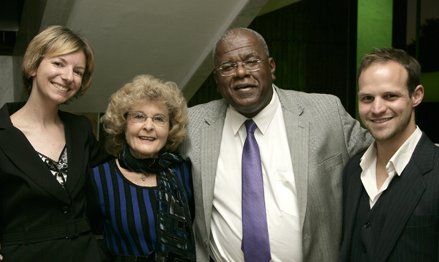Latest News Archive
Please select Category, Year, and then Month to display items
01 September 2020
|
Story Dr Nitha Ramnath
|
Photo Supplied
 The UFS’ Devina Harry was accepted into the Kader Asmal Fellowship Programme.
The UFS’ Devina Harry was accepted into the Kader Asmal Fellowship Programme.
The UFS’ own Devina Harry is set to travel to Ireland in September 2020 to begin a year-long Fellowship Programme for a Master of Business. As one of 20 students selected from the African continent, Devina was recently accepted into the Kader Asmal Fellowship Programme, which affords her the opportunity to study in Ireland during the 2020/21 academic year.
A research assistant in the Department of Business Management, Devina holds an Honours in Marketing. “I am very grateful to be awarded this scholarship and excited about this new journey,” says Devina, who is scheduled to begin the programme in October 2020. “I hope to come back to South Africa and contribute to my field of study,” she says.
Devina went through a rigorous application process and had to meet the criteria for selection, one of which is having a minimum average grade point of 75% for her honours.
Prof Brownhilder Nene, Head of Department: Business Management, gave Devina some words of encouragement: “You will never know how far you can go unless you try. Thank you, Devina, for stepping out of your comfort zone and getting this scholarship.”
The Kader Asmal Fellowship Programme is a South African strand of a broader Ireland-Africa Fellows Programme managed by the
Irish Department of Foreign Affairs and Trade. It was set up in 2012 in honour of the late
Professor Kader Asmal, and is a fully-funded scholarship opportunity for those who want to develop skills and knowledge to contribute to the achievement of the Sustainable Development Goals in South Africa.
'England, the English and the problem of education in South Africa.’
2013-09-26
|
 |
Attending the lecture were, from the left: Dr Susan Brokensha, Senior Lecturer: Department of English; Prof Rosemary Gray, Professor Emeritus (Honorary Life Vice-President of the English Academy of Southern Africa); Prof Jonathan Jansen; and Dr Thinus Conradie, Lecturer: Department of English.
Photo: Johan Roux
26 September 2013 |
Prof Jonathan Jansen: Lecture
The university celebrated the life of one of South Africa's most renowned art critics, hosting the 2013 English Academy’s Percy Baneshik Memorial Lecture on the Bloemfontein Campus.
The keynote lecture was delivered by Prof Jonathan Jansen, Vice-Chancellor and Rector, who joined a distinguished list of speakers to have delivered the lecture. Presented annually by the English Academy of Southern Africa, an association dedicated to promoting the effective use of English as a dynamic language in Southern Africa, past speakers include Prof Es’kia Mphahlele, Prof Njabulo Ndebele, Dr Alan Paton and Prof Albie Sachs. The lecture is hosted at venues across the country and this year Bloemfontein paid tribute to Percy Baneshik.
In his speech Not even colonial born: England, the English and the problem of education in South Africa,' Prof Jansen addressed the dilemma of the politics of language in both school and university education today.
Talking about the dominance of English in schools, Prof Jansen said it is the language of choice because indigenous languages are so poorly taught. "Simply learning in your mother tongue is absolutely no guarantee of improved learning gains in school. The problem is not the language of instruction; it is the quality of teaching, the knowledge of curriculum and the stability of the school."
Prof Jansen told the audience in the CR Swart Hall that Afrikaans-exclusive, or even Afrikaans-dominant white schools represent a serious threat to race relations in South Africa. "You simply cannot prepare young people for dealing with the scars of our violent past without creating optimal opportunities in the educational environment for living and learning together."